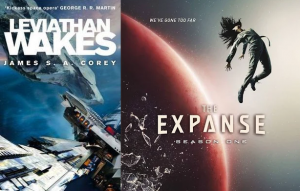
For Game of Thrones / Song of Ice and Fire fans, now that the tv series is winding down, and neither the prequel tv series nor the next book will be here any time soon, the question is what to read and/or watch next. The answer a lot of people are recommending is the science-fiction epic The Expanse, which even gets frequently described (somewhat simplistically, but not entirely unreasonably) as “Game of Thones [and/or Song of Ice and Fire] in space.”
I want to add my own enthusiastic recommendation to that throng; The Expanse isn’t as popular as Game of Thrones, but it deserves to be, because it’s good in many of the same ways (complex politics viewed with a cynical eye; engaging but flawed characters; redemption arcs successful and otherwise; exciting action; willingness to kill off major characters; and a creepy menace growing on the periphery of the known world, to which the main players are initially oblivious). Moreover, while I don’t believe that the authors are either libertarians or anarchists, the series offers a great deal to interest libertarians (especially left-libertarians) and anarchists alike.
WARNING: While I’ll keep my descriptions mostly vague, some minor spoilers do follow.
The Expanse is both a series of books, and a tv series based thereon. Of the books, by James S. A. Corey (the pen name of authors Daniel Abraham and Ty Franck), eight volumes have been published, and a final ninth volume is on the way. (The authors have been setting a rather faster pace than G. R. R. Martin, averaging a book a year.) There are also a handful of short stories (thus far available only as eBooks) and a prequel comic. (These additional stories are sometimes dismissed as “optional,” but I don’t think they are; they offer vital backstory for the characters and situations in the main books. Plus they contain some of Corey’s most beautiful writing. I offer a guide to reading order below.)
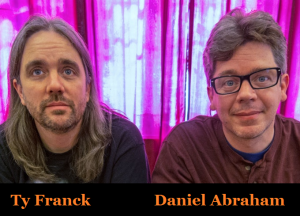
The tv series ran for three seasons on SyFy before being cancelled there (less because of low viewing figures than because of what are being described as “restrictive distribution arrangements”), but it’s been renewed for a fourth season on Amazon Prime, and the first three seasons are likewise now available there. As with Game of Thrones, the authors of the books are more involved in the adaptation than is typical, and the tv series’ degree of fidelity to the books also seems to be about the same as with Game of Thrones (overall the same story and characters but with lots of smaller-scale changes).
The similarities aren’t coincidental; Ty Franck (one half of “Corey”) has worked as an assistant to Martin, and the series began as an RPG in which Martin was a participant. The books in particular follow a structure similar to that of Martin’s books, rotating among different viewpoint characters for different chapters (though without quite so many characters as in Song of Ice and Fire), with each book having a prologue featuring a different viewpoint character from those in any of the later chapters. Moreover, the prologue to each of the first books in each series teases the ominous-threat-from-beyond before initially leaving it behind for the later chapters.
But I don’t want to give the impression that The Expanse is just the saga of Westeros transposed to space. The Expanse is definitely its own thing, and I’d say owes less to GoT than GoT owes to, say, Dune.
While I’ve read all the (thus far extant) books and stories, I haven’t yet gotten very far into the tv series, but what I’ve seen so far is amazing. The setting, for both books and series, is a near-ish future, a couple of centuries out, in which humanity has spread through the solar system but as yet no farther, and the governments of Earth and Mars, settlers of the “outer planets” (the asteroid belt plus the gas-giant moons), and various corporate interests, rebel alliances, and black market actors are all jockeying for power and resources. Earth is an overpopulated, environmentally devastated, over-bureaucratised one-world polity whose wide but shallow welfare state (provider of basic economic assistance, known as “basic”) has ended the threat of starvation but left the bulk of its population with few opportunities, at the mercy of predatory criminal gangs and sex traffickers, and with a kind of spiritual malaise:
Time had not been kind to the city [= Baltimore]. Its coastline was a ruin of drowned buildings kept from salvage by a complexity of rights, jurisdictions, regulations, and apathy until the rising sea had all but reclaimed them for its own. … Sparrows Island stood out in the waves like a widow watching the sea for a ship that would never come home, and Federal Hill scowled back at the city across shallow, filthy water, emperor of its own abandoned land. Everywhere, all through the city, space was at a premium. Extended families lived in decaying apartments designed for half as many. Men and women who couldn’t escape the cramped space spent their days at the screens of their terminals, watching newsfeeds and dramas and pornography and living on the textured protein and enriched rice of basic. For most, their forays into crime were halfhearted, milquetoast affairs – a backroom brewer making weak, unregulated beer; a few kids stealing a neighbor’s clothes or breaking their furniture; a band of scavengers with scrounged tools harvesting metal from the buried infrastructure of the city that had been. Baltimore was Earth writ small, crowded and bored. Its citizens were caught between the dismal life of basic and the barriers of class, race, and opportunity, vicious competition and limited resources, that kept all but the most driven from a profession and actual currency. (“The Churn.”)
This age, this generation, traded its demons for the void. When I was young we were poor, and we are poor again now but differently. When I was young we were afraid to starve, to be without medicines or homes, and the teeth of it gave us meaning. Now we fear being less important than our neighbors. We lost our junkie’s need, and we don’t know what to put in its place. (“The Hunger After You’re Fed.”)
Mars, by contrast, is an independent, prosperous, somewhat militarised, regimented, and gung-ho society collectively dedicated to a multi-generation terraforming project (though some of its citizens dream of a freer lifestyle they might enjoy in their own lifetimes, elsewhere). The denizens of the outer planets, meanwhile, are a decentralised and increasingly resentful underclass who have developed a distinctive culture, language, and (thanks to low gravity) physique, and who have long been exploited by the governmental and corporate powers based on Earth or Mars – yet this oppressed region still represents a desirable frontier for Earth’s underclass yearning for a fresh start:
It was impossible to know how many unregistered men and women were eking out lives on the margin of society …. They congregated in condemned buildings and squats, traded in the gray-market economy of unlicensed services …. all breathing the same air while the plume of the orbital transport marked the sky gold and black above them. … Erich looked up at the sky with a longing he resented. … The blackness of space where merit counted more than the placement on a bureaucrat’s list, where the brothels were licensed and the prostitutes had a union, where freedom was a ship and a crew and enough work to pay for food and air. It called to him with a romance that made his heart ache. (“The Churn.”)
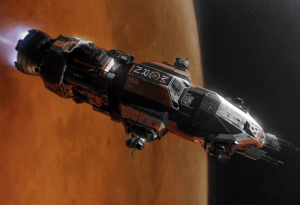
But all of this is background for the main focus of the series, which is precisely on the freedom of “a ship and a crew and enough work to pay for food and air” – specifically the crew of an independent (well, salvaged) (well, sort of stolen) ship called the Rocinante (named after Don Quixote’s horse – as well as, I’m guessing, after the spaceship in Rush’s Cygnus X-1 song series, as the authors are known to be Rush fans). The Rocinante’s crew of misfits, outlaws, and losers, drawn alike from Earth, Mars, and the outer planets, are thrown together by an unexpected catastrophe and initially have little in common, but over time come to bond together into a family even while they become entangled in some fairly massive conflicts and discoveries that will affect the future of all humanity. The story can be quite grim, but also at times quite funny.
With the exception of some ancient and unfathomable alien tech (which follows Clarke’s Third Law), The Expanse goes in for scientific and technological realism in a way that is rare in tv or movie science fiction (though less rare in books). Where many shows treat such details as zero-gravity and its physiological effects, or the lightspeed limit on communication and travel, or the likely inhospitability of alien ecosystems, as impediments to the plot (or, reasonably enough, the budget) – factors to ignore, work around, or drop entirely – The Expanse leans in to them, making them crucial elements of the plot.
Another thing The Expanse does well that was formerly uncommon in science fiction tv series, though it’s rather more common nowadays, is to present our future society as clearly multiracial and multicultural. Admittedly, the series (especially in the books) starts off focusing primarily on two white guys (perhaps not surprising given that the authors are likewise two white guys); but it swiftly becomes an ensemble drama with strong central roles for female characters and characters of multiple ethnicities. (The Expanse definitely features greater racial diversity in its main characters than does Game of Thrones, whose main characters are nearly all drawn from a handful of very white aristocratic families.)

Here’s a helpful video detailing both the scientific realism and the three primary power blocs of The Expanse:
While in its visual look, mournful soundtrack, flawed characters, and political conflicts the tv series is often reminiscent of Battlestar Galactica, the movies and/or tv shows it most brings to mind, for me, are Blade Runner, Alien, Firefly, and Babylon 5: Blade Runner for the noir-detective aspects; Alien and Firefly for the focus on ordinary working stiffs and/or black-market entrepreneurs hauling stuff from planet to planet on a very lived-in spaceship; Firefly and Babylon 5 for the background of interplanetary conflict; and Alien and Babylon 5 for the perilous attempts, by corporations and/or governments, to exploit and weaponise ancient alien biotechnology they’ve discovered but don’t fully understand. (The fact that one female character is a former terrorist wrestling with her past might also be a nod to Deep Space Nine.)
As for literary influences, the authors have mentioned the impact of Alfred Bester’s The Stars My Destination and Frederik Pohl’s Heechee series; and I think I also detect nods to Robert Heinlein’s The Moon Is a Harsh Mistress and Kim Stanley Robinson’s Mars trilogy. In addition, I’m reminded of Vernor Vinge’s Fire Upon the Deep and Joan Vinge’s Heaven Chronicles, though I’m less sure they’re an influence.
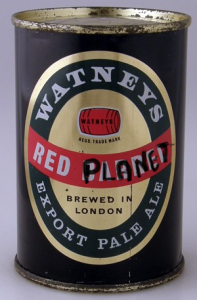
There’s a popular internet theory that The Expanse takes place in the same universe as Andy Weir’s The Martian, based on the fact that one of the Martian ships mentioned in passing in the books is named the Mark Watney. But outer-planet ships named the Dagny Taggart and John Galt likewise get a mention, and nobody thinks this means that The Expanse takes place in the same universe as Atlas Shrugged. (There’s also a ship named the Andreas K, a clear homage to the late Andreas Katsulas, one of the lead actors on Babylon 5 and also an occasional guest star on various iterations of Star Trek.)
Among the various political factions portrayed, none is monolithic; each contains both sympathetic and unsympathetic characters and viewpoints (and those individual characters themselves tend to be a mixture of sympathetic and unsympathetic traits, although there are always a few who are just unredeemable assholes). The authors, while fairly even-handed, clearly favour the O.P.A. (Outer Planets Alliance, the asteroid-belt group resisting centralised control from Earth or Mars) a bit more than the other factions; but the O.P.A. (or certain sub-factions within it, anyway) are also responsible for some of the series’ worst acts of terrorism, and the story’s main protagonists (the crew of the Rocinante), while they’re willing to work with each of the major factions when necessary, prefer to remain independent of any of them so far as possible.
The O.P.A. rebels are likewise politically diverse. Some are described as devotees of “neo-Libertarian property theory” and the idea that “taxation is theft”; but others seem more traditionally left-wing, and in any case most of them certainly show no rigid attachment to the nonaggression principle. The O.P.A. symbol, described rather vaguely as a “split circle” in the books (possibly intended to be a circle representing the solar system, bisected by a line representing the asteroid belt, although this is never made explicit), is made to look more like the anarchy symbol (or even the ALL symbol!) in the tv series:
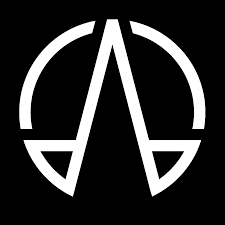
and there’s also a version floating around on the internet that is even more clearly the anarchy symbol, though I can’t recall seeing this version on the show itself so far:

The O.P.A. does not seem to be an anarchist organisation, however; at least the main, “respectable” faction within the O.P.A. is trying to become a government (though not all of the other O.P.A. factions are on board). Interestingly, Ty Franck himself can be seen wearing an anarchy version of the O.P.A. symbol in this video:

While the books don’t offer clear support to any one political ideology, there are two political morals that get repeatedly stressed. One is that highly centralised authority is generally likely to be a bad idea. The other is that while collateral damage may sometimes be necessary, if you find that the political and/or military objective you’re committed to requires a whole lot of collateral damage, you probably need to find a different objective; or, more briefly, that humanity trumps politics.
One can also find such anarchist-friendly insights in the books as these:
“There has to be a way to come to a final decision.”
“No, there doesn’t. Every time someone starts talking about final anythings in politics, that means the atrocities are warming up. Humanity has done amazing things by just muddling through, arguing and complaining and fighting and negotiating. It’s messy and undignified, but it’s when we’re at our best ….” (Persepolis Rising, p. 394.)
“Governments exist on confidence. Not on liberty. Not on righteousness. Not on force. They exist because people believe they do. Because they don’t ask questions.” (Tiamat’s Wrath, p. 357.)
There’s also a major plot point in the books that turns explicitly (and I mean explicitly, with the standard grid reproduced and everything) on the question of whether iterated prisoner’s dilemma situations can still be relied on to produce cooperation when the impact one side can make by defecting is massively greater than that of the other, as in puny humans versus incomprehensibly powerful alien juggernauts. (I don’t think it’s too much of a spoiler to reveal that the answer turns out to be a very Humean “not so much,” given that the likely outcome is foreseen well ahead of time by every character whose head is not inserted in his or her ass.)
An interesting feature of the books’ titles is that each contains some mythological or historical or literary metaphor that is never referenced in the actual books themselves. For example, Persepolis Rising implicitly compares one of the books’ factions to the ancient Persian Empire, but in the books that faction is instead named “Laconia,” after ancient Sparta, and no Persian analogy is mentioned. (While the historical Spartan and Persian systems were politically very different from each other, and of course were also enemies, both comparisons make sense in context.)
The Books (and short stories):
Below I list the short story “The Hunger After You’re Fed” as part of the series, even though it’s not quite officially so; the authors have described it as “almost … a prequel” to The Expanse. But it coheres well with the overall series, it’s haunting and thought-provoking, and it sheds light on the workings and effects – both positive and negative – of the future Earth’s universal basic economic assistance policy that’s part of the background of the rest of the series. Plus, appropriately to its subject matter, it’s free!
Publication order:
- Vol. 1: Leviathan Wakes
- “The Butcher of Anderson Station” (Kindle or other eBook)
- Vol. 2: Caliban’s War
- “Gods of Risk” (Kindle or other eBook)
- “Drive” (free online)
- Vol. 3: Abaddon’s Gate
- “The Churn” (Kindle or other eBook)
- Vol. 4: Cibola Burn
- Vol. 5: Nemesis Games
- “The Vital Abyss” (Kindle or other eBook)
- Vol. 6: Babylon’s Ashes
- “The Hunger After You’re Fed” (free online)
- “Strange Dogs” (Kindle or other eBook)
- Vol. 7: Persepolis Rising
- Expanse: Origins
- Vol. 8: Tiamat’s Wrath
- Vol. 9: title TBA
Diegetic chronological order:
- “The Hunger After You’re Fed” (free online)
- “Drive” (free online)
- “The Churn” (Kindle or other eBook)
- “The Butcher of Anderson Station” (Kindle or other eBook)
- Expanse: Origins
- Vol. 1: Leviathan Wakes
- Vol. 2: Caliban’s War
- “Gods of Risk” (Kindle or other eBook)
- Vol. 3: Abaddon’s Gate
- “The Vital Abyss” (Kindle or other eBook)
- Vol. 4: Cibola Burn
- Vol. 5: Nemesis Games
- Vol. 6: Babylon’s Ashes
- “Strange Dogs” (Kindle or other eBook)
- Vol. 7: Persepolis Rising
- Vol. 8: Tiamat’s Wrath
- Vol. 9: title TBA
My recommended reading order:
- “The Hunger After You’re Fed” (free online)
- “Drive” (free online)
- Vol. 1: Leviathan Wakes
- “The Butcher of Anderson Station” (Kindle or other eBook)
- Vol. 2: Caliban’s War
- “Gods of Risk” (Kindle or other eBook)
- Vol. 3: Abaddon’s Gate
- “The Churn” (Kindle or other eBook)
- Vol. 4: Cibola Burn
- Vol. 5: Nemesis Games
- Expanse: Origins
- “The Vital Abyss” (Kindle or other eBook)
- Vol. 6: Babylon’s Ashes
- “Strange Dogs” (Kindle or other eBook)
- Vol. 7: Persepolis Rising
- Vol. 8: Tiamat’s Wrath
- Vol. 9: title TBA
The TV Series (so far):
- Season 1 (blu-ray or online)
- Season 2 (blu-ray or online)
- Season 3 (blu-ray or online)
- Season 4 (coming soon)
And finally, some videos to give a flavour of the series:
